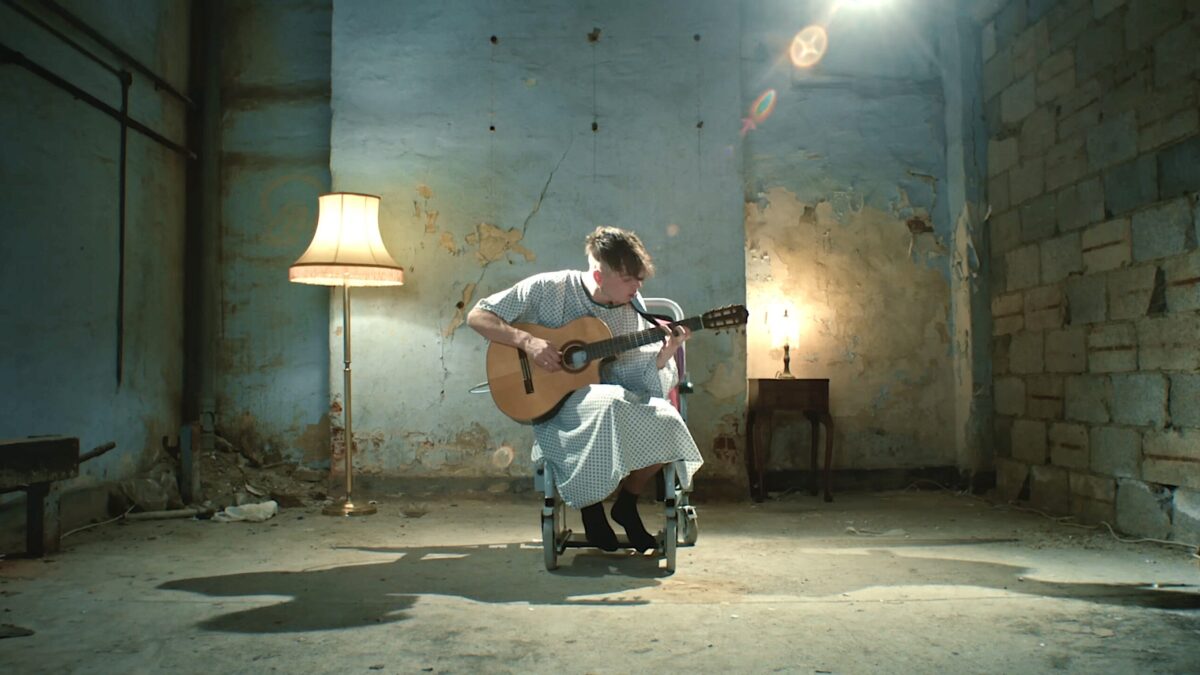Gen Z is being marked down as the most mentally ill generation to date. Disturbing rates of anxiety, self-harm, suicide, and depression plague young people, with professionals calling it an “epidemic.”
That’s the cultural context for “Hi Ren,” a nine-minute rhythmically and lyrically genius blend of rap, singing, and acoustic guitar by English musician Ren Gill.
“Hi Ren,” thrusts you into the harrowing internal battle within Gill’s tormented psyche. The Music video is filmed in an unsettling room inside a mental institution, with Gill dressed in a hospital gown and seated in a wheelchair. The song appears to be a vocal and visual representation of mental illness or perhaps addiction.
Throughout the song, Gill switches character between a scary and belittling version of himself, to a positive part of himself that wants to thrive, make music, and be fulfilled.
At first blush, “Hi Ren” seems to be yet another song about mental health struggles and internal turmoil. When the “good” Ren wants the “bad” Red to go away, “bad” Ren responds, “You think that you can amputate me? I am you, you are me, you are I, I am we. We are one, split in two that makes one so you see? You got to kill you if you wanna kill me.”
However, things take on a dramatically new and counter-cultural meaning when the “bad” Ren reveals himself as entirely separate from the real Ren:
I was created at the dawn of creation,
I am temptation
I am the snake in Eden,
I am the reason for treason
Beheading all Kings,
I am sin with no rhyme or reason,
Sun of the morning, Lucifer,
Antichrist, father of lies,
Mephistopheles,
Truth in a blender,
Deceitful pretender,
The banished avenger,
The righteous surrender
When standing in-front of my solar eclipse,
My name it is stitched to your lips so see
I won’t bow to the will of a mortal, feeble and normal
You wana kill me? I’m eternal, immortal
I live in every decision that catalysed chaos
That causes division
I live inside death, the beginning of ends
I am you, you are me, I am you, Ren
The development of the song reveals the earlier assertion that “bad” Ren is the same as “good” Ren is a malicious falsehood. “Bad” Ren is not Ren at all, but the Devil himself—the “father of lies.” He is “truth in a blender,” a “deceitful pretender.”
So much of the psychological turmoil that many people struggle with is rooted in sin and evil. Psyche means soul, and the term psychiatry means the treatment of the soul. Yet the modern mental health industry rejects the very essence of what it seeks to study and treat.
Since many practitioners and the heights of the profession deny the existence of the soul, modern mental health professionals must merely treat with surface-level symptoms. This is why they turn to psychotropic drugs so readily and are often incapable of properly sourcing and curing mental illness.
The greatest trick the Devil ever pulled was convincing the world he doesn’t exist. There can be no remedies or authentic healing processes if we are unable to recognize the very real evil forces behind many people’s psychological suffering.
“Hi Ren” not only identifies the root cause of many mental health issues, it puts forward the correct cure. Instead of promoting a pill to numb the pain, “Hi Ren” offers a different solution. After the devil’s monologue, the real Ren sings:
I was made to be tested and twisted
I was made to be broken and beat
And you know me my will is eternal
And you know me you’ve met Me before
Face to with a beast I will rise from the east
And I’ll settle on the ocean floor
Gill recognizes that as a sinful human, he is meant to struggle, and there is power in embracing that struggle. Indeed, the only real way for people to flourish is to let go of pride and accept and even embrace the humiliating realities of life. Gill gets this, making his song a radical departure from the mental health industry’s sole focus on “chemical imbalances” and “biological predispositions” to various mental ailments.
Gill expands on this in a Twitch stream about the song. Growing up, he explains, he suffered from autoimmune complications and psychosis caused by undiagnosed Lyme disease. As all of his friends began starting their lives in their 20s, Gill spent his days lying in bed. He described feeling physically and psychologically tormented until he changed his mindset.
Once Gill “stopped fighting against the pain and stopped saying, ‘Why me?’” he found happiness. He began “using [his] limitations” and “alchemizing it into something more productive,” namely music. In other words, Gill learned to carry his cross, embrace suffering, and turn his pain into something beautiful.
Satan hates humanity. As Gill sings from the perspective of the Devil, “I won’t bow to the will of a mortal, feeble and normal.” This apparent disgust is actually a manifestation of jealousy. Humanity is beloved by God. We are made in His image.
Out of hatred and envy, the Devil wants to thwart this closeness. The only escape from the father of lies and the mental anguish he wishes to inflict on us is to put all our trust in God, and to accept our human suffering and use it for good.
Rarely is this generation given the opportunity to reflect on its existence in a metaphysical way. Gen Z is considered shallow, narcissistic, and emotionally detached. Its hit songs’ lyrics are typically debauched and meaningless, and their melodies often tired and lazy.
“Hi Ren” could not be more different. While Gill claims he doesn’t identify with any particular religion, deep and ancient Christian themes take center stage in “Hi Ren.”It is everything a popular song shouldn’t be: long, not overly produced, and complex. Yet it’s popular.
It is a testament to the fact that the human desire for truth and purpose persists in spite of TikTok and Snapchat, and that young people know modern culture and psychiatry have failed us.









